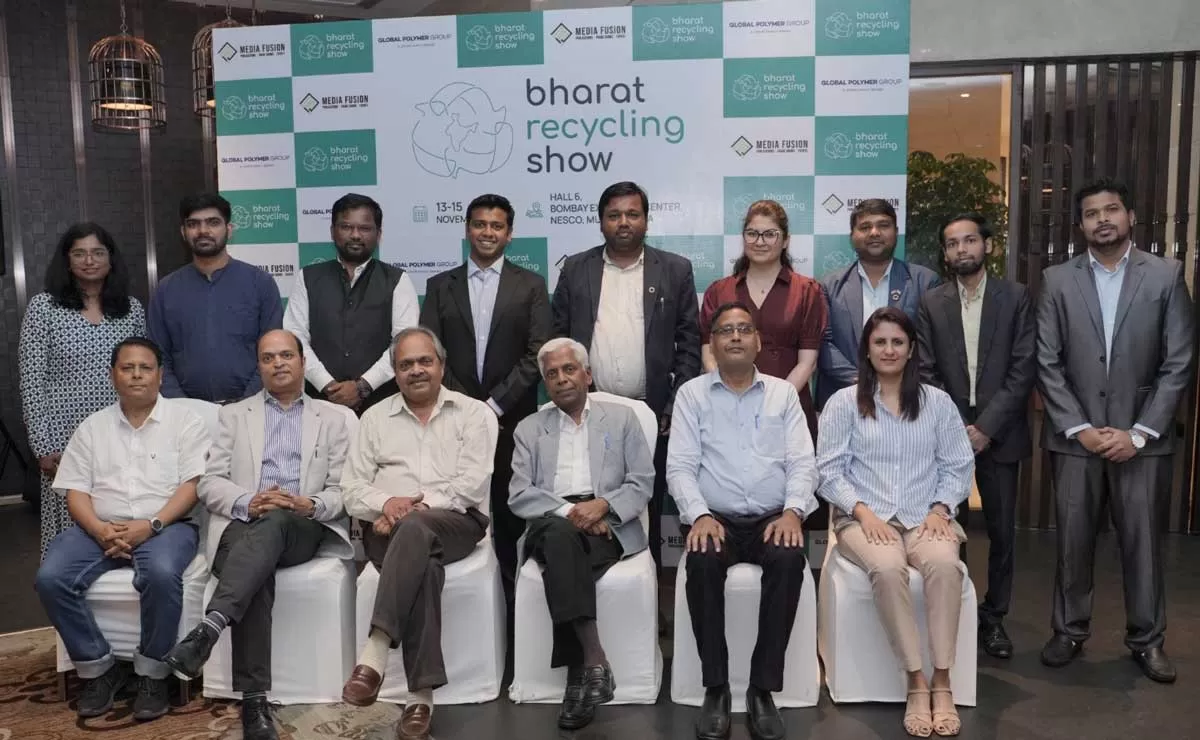As the industry gears up for Bharat Recycling Show 2025, Media Fusion and Crain Communications successfully hosted the second edition of its roundtable series on 27th June in New Delhi. The session brought together a panel of esteemed experts and stakeholders from across India to deliberate on two pressing concerns in the recycling ecosystem- E-Scrap and End-of-Life Battery Management.
The Roundtable served as a vital platform for discussion on government initiatives, policy implementation, EPR regulations, and the practical challenges surrounding the safe and sustainable management of e-waste and used batteries.
The session featured participation from key voices in the sector, including L. Pugazhenthy, Executive Director of the India Lead Zinc Development Association; Satish Sinha, Associate Director at Toxics Link; Sanjeev Srivastava from NAMO eWaste; Ashok Kumar Thanikonda, Senior Program Officer, Global Green Growth Institute; Rakesh Mallick, CEO of E-Waste Recyclers India; Gautam Mehra, Chief of Innovation and R&D at OpenGate Global Enterprises; Akshit Jain, Founder of Recyclify; Preeti Tiwari, Head of Business Development EPR, Landbell GreenForest Solutions; Pallas Chandel, Climate Change Advisor, GIZ; Mitradev Sahoo, Program Associate - Electric Mobility Sustainable Cities and Transport, WRI India; Arvind Sharma, Senior Director (IT) at the Ministry of Corporate Affairs; and Kuldeep Bartariya, Director at Shreeji Academy and Member of Vidyanjali, Ministry of Education.
The panel unanimously recognised that India’s rapid growth in digital infrastructure, electric mobility, and smartphone adoption has led to an alarming increase in e-waste and battery waste. However, this growth has not been matched with adequate systems for collection, traceability, and environmentally sound disposal.
L Pugazhenthy, Executive Director of the India Lead Zinc Development Association, highlighted “The fragmented and largely unregulated collection of batteries in India remains a key concern. While lead-acid batteries used in vehicles and inverters are relatively traceable, dry cells, button cells, and lithium-ion batteries often end up in informal scrap channels or are improperly discarded. Weak enforcement of battery waste regulations and poor compliance by smaller manufacturers further contribute to large-scale environmental leakage.”
“The diversion of used lead batteries to the informal sector continues largely due to unchecked practices by dealers. While the Battery (Management & Handling) Rules, 2001 define responsibilities for various stakeholders, they fall short in clearly outlining obligations for dealers—giving them a virtual free hand. ILZDA has raised this regulatory gap with the CPCB, but action on the matter is still awaited.” he further added.
atish Sinha, Associate Director, Toxics Link, echoed the concern, stating that “Despite the presence of well-framed rules, the absence of stringent enforcement, effective penalties, and coordinated monitoring continues to enable non-compliant practices.” The panelists highlighted the issue of government auctions often being accessed by intermediaries or informal players, defeating the objective of responsible recycling.
India's e-waste management market, valued at USD 2.96 billion in 2024, is projected to reach USD 8.92 billion by 2033, growing at a robust CAGR of 12.07% from 2025 to 2033. As the third-largest producer of e-waste globally—accounting for nearly 10% of the world’s total output—India faces a pressing need for sustainable e-waste disposal. Rapid urbanization, rising electronic consumption, and increased environmental awareness are driving demand for efficient collection and recycling infrastructure, making safe e-waste management a national priority.
Preeti Tiwari, Head of Business Development EPR, Landbell GreenForest Solutions, drew attention to the 2022 Battery Waste Management Rules and emphasised that while the EPR framework is a significant move, its success depends on a well-defined reverse supply chain, ongoing monitoring, and active responsibility from manufacturers.
Mr. Gautam Mehra, Chief of Innovation and R&D, OpenGate Global Enterprises, said “Battery and e-waste recycling involves hazardous components, complex dismantling, and often lacks sufficient infrastructure. The importance of transparency, proper collection systems, and traceability, without which responsible recycling becomes extremely difficult to enforce.”
Akshit Jain, Founder of Recyclify said “The most informal recyclers, despite handling a significant volume of waste, do not disclose or document their processes, leaving major gaps in national-level data.”
Mitradev Sahoo, Program Associate – Electric Mobility, Sustainable Cities and Transport at WRI India, and Mr. Ashok Kumar Thanikonda, Senior Program Officer at the Global Green Growth Institute, shared insights on best practices from other countries in e-waste management and showcased how data plays a crucial role in driving effective solutions.
Pallas Chandel, Climate Change Advisor at GIZ, brought a unique perspective by mentioning “The rural and peri-urban regions, despite their increasing usage of electronic devices, are often left out of formal waste collection systems. In the absence of basic infrastructure, electronic waste is frequently burned, leading to severe air and water pollution.” She advocated for decentralised collection models, targeted training for informal rural workers, and a more inclusive EPR framework that extends to non-urban India.
Sanjeev Srivastava, CEO, NAMO eWaste, emphasised“The absence of financial incentives continues to be a major constraint for India’s recycling sector. Introducing targeted support for formal players can serve as a catalyst, encouraging more start-ups and MSMEs to adopt advanced technologies for critical mineral extraction. This, in turn, will pave the way for improved infrastructure, higher compliance, and a more robust circular economy.”
The panelists collectively called for stronger rule enforcement, real-time traceability, and the integration of the informal sector into formal systems. They also recommended mandatory audits, enforcement of minimum pricing to curb undercutting, and greater public awareness. There was a clear consensus on the need to bridge regulatory and infrastructure gaps to make battery and e-waste recycling safe, traceable, and sustainable.
Bharat Recycling Show 2025, is scheduled to take place from 13 to 15 November at Hall 6, NESCO Exhibition Center, Mumbai. With a focused commodity showcase and high-level discussions, the event aims to accelerate India's recycling ecosystem and drive long-term industry transformation.





















